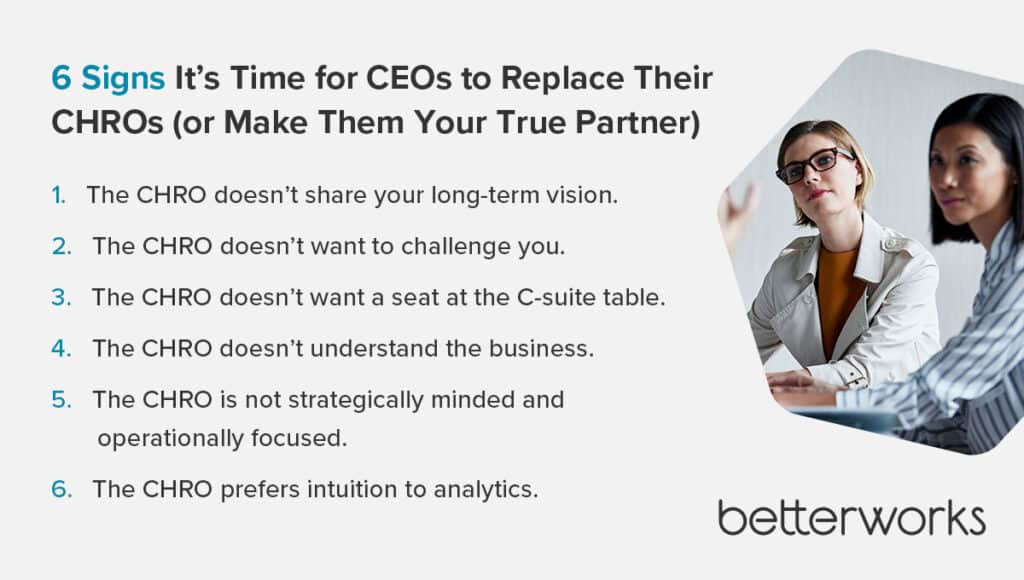- Why replace your CHRO?
- #1: The CHRO doesn’t share your long-term vision
- #2: The CHRO doesn’t want to challenge you
- #3: The CHRO doesn’t want a seat at the C-suite table
- #4: The CHRO doesn’t understand the business
- #5: The CHRO is not strategically minded and operationally focused
- #6: The CHRO prefers intuition to analytics
- The CEO-CHRO partnership
HR practices are rapidly evolving. Historically, HR has operated in a silo, and its role has been tactical and transactional. Today, the best CHROs are strategic and focused on driving business outcomes by ensuring the organization’s people are empowered to be their best.
The only way to accomplish this is to make the CHRO a part of the C-suite. The HR function is so essential to business success that its role and effectiveness should be monitored at both the executive and board levels. The CHRO should report directly to the CEO, as Betterworks VP of HR Transformation Jamie Aitken and I point out in our upcoming book, Make Work Better: Revolutionizing How Great Bosses Lead, Give Feedback and Empower Employees.
Why replace your CHRO?
This new state requires CEOs willing to work with CHROs as strategic partners and CHROs with the right attitude, skills, and knowledge to succeed in that role.
Not all CHROs fit that description, and when they don’t, it’s time for CEOs to consider replacing them because the company’s health depends on it. And, of course, a note here to HR leaders: If your CEO doesn’t view you as a partner in the business, that may be a sign that it’s time to look elsewhere.
Following are six signs that CEOs should replace their CHROs or give them the latitude and influence they need to help the organization and its workforce thrive.

#1: The CHRO doesn’t share your long-term vision
Effective CHROs, like CEOs, have a long-term vision for the company. If HR operates as an island, the CHRO is likely focused on short-term (weeks or months) initiatives rather than aligning with the longer-term business strategy around core issues such as talent recruitment, retention, and company culture. If the CHRO isn’t asking tough questions to ensure that HR’s objectives align with the overall business strategy, that person can’t anticipate organizational opportunities, challenges, or requirements.
CHROs who focus on transactional activities rather than anticipating business challenges and needs may be unable to build the flexibility to pivot and change course when business circumstances change. In short, CHROs who are behind the times increasingly represent a business risk.
The last thing a CEO wants is to know their organization is no longer competitive. The only way to remain competitive is to have a CHRO beside you who can help you empower your company’s most important resource — people. The right HR leader in an organization can give you the competitive edge you need and be a game-changer.
When a CHRO is interested in and passionate about the company and operates from a place where the company’s vision is always front and center, that creates a vastly different strategy that will help the enterprise thrive.
Likewise, CEOs who refuse to consider CHROs among their closest business partners — if not the most important — should rethink their views. If your CHRO reports to the CFO, for example, you’re sending a clear signal that you consider HR issues to be tactical and would rather not be bothered by them.

#2: The CHRO doesn’t want to challenge you
Traditional CHROs have their own territory, which may be isolated from the rest of the company. A classic trait is following practices that no longer make sense for your business. For example, an HR leader may see the need to decouple roles from skills to build capacity and agility across functions due to workforce shortages. Still, they won’t ask the CEO to reimagine job structures out of fear that the CEO may reject the suggestion as too radical. The CHRO may even hesitate to ask the CEO to rethink HR’s role as essential for the health of the entire business.
Traditional CHROs tend to be uncomfortable challenging CEOs because:
- They’re not an integral part of the C-suite and report to another C-Suite executive
- They’re not empowered to speak to the CEO on a peer level
- The metrics they’re measured by make them feel less accountable for business results
- They lack the nerve to speak up
The most effective CEOs want to be challenged by senior staff members, including the CHRO. If the CHRO is unwilling or incapable of doing that, then HR’s value — and the business — suffer.
A truly great CHRO will know what’s causing issues for the CEO that the CEO may not know about. They also know what’s happening with employees and the culture in a way no one else does
“We believe that every CEO needs a mirror, and that mirror should be their CHRO. …A great CHRO is your team of rivals and your team of teams all in one. They are going to tell you what you need to hear, not what you want to hear.”
— Make Work Better: Revolutionizing How Great Bosses Lead, Give Feedback and Empower Employees
#3: The CHRO doesn’t want a seat at the C-suite table
Historically, CHROs have been absent from the C-suite despite the “C” in their title. Their department may still operate as an island, which traditional HR leaders prefer.
In the worst case, traditional CHROs don’t want a direct line to the CEO or other executives and may not care if they’re excluded from executive meetings. Instead, they’re happy to stay in their lane and tend to lack decision-making autonomy.
Modern CEOs empower CHROs to make decisions for themselves on behalf of the company because, like the other C-suite members, modern CHROs make a point of understanding the company’s goals.

#4: The CHRO doesn’t understand the business
Siloed CHROs tend not to understand the company’s priorities and plans and do not inquire about such issues. They lack curiosity about the business’s products and services and what they enable. Generally, such individuals don’t possess business acumen, nor do they build alliances across the organization. Instead, they’re content doing transactional work in a vacuum. For example, such HR leaders might focus on enforcing policies, keeping employees happy, making sure they fill open requisitions, and preventing the company from being sued. While these are essential HR functions, they do not represent the entire business landscape.
This is a precarious scenario for modern companies, given the competitive talent marketplace and high levels of turnover. Job candidates and employees increasingly want to work with companies that promote employee-centric cultures, continual career growth and meaningful work, trust, transparency, inclusion, ESG initiatives, and DEI&B. If CHROs are out of step with modern workstyles and expectations, attracting and retaining the right talent may be more difficult.
Another sign that it’s time to replace your HR leader: they’re technologically averse or prefer to delegate responsibility for understanding HR technologies to a staff member. With technology driving workforce transformation and efficiency, contemporary HR leaders must be tech-savvy. While they don’t need to understand technology as deeply as their counterparts in IT, they should be willing and able to learn how various technologies work and how the business can leverage them to enable workforce transformation.
#5: The CHRO is not strategically minded and operationally focused
When a CHRO is behind the times, they don’t continually consider how their actions support the business. Since they more often focus on short-term initiatives instead of long-term strategies, they have difficulty implementing a sound strategy and following it up with a targeted action plan, making them operationally bootstrapped.
A set of tactics must have larger, long-term strategies to guide them to help the organization build a thriving, agile, and sustainable workforce that delivers a competitive advantage. It’s worth noting that CHROs tend to be operationally focused, but not necessarily in the same way. For example, a traditional CHRO views HR as primarily transactional, so “operational effectiveness” can mean following antiquated practices and processes.
The right CHRO is both strategically minded and operationally focused. They consider how to solve big issues, such as:
- Do we have the skills, or are we building the skills needed in the shifting landscape?
- Do we have the right people, skill sets, attitudes, and culture to take us there?
- Are we building future leaders and considering succession plans if key people leave?
- Do we have the proper tools, systems, and processes to support these initiatives?
While traditional CHROs can administer HR and company policies, they are not the game-changers modern CHROs tend to be. A modern CHRO wants to be as effective as possible and has an ethos of constant improvement and learning. They can adapt to changing circumstances and spearhead and enable workforce transformation.
“We know, without a doubt, that the best-performing companies are the ones who make a seat at the table for HR.”
#6: The CHRO prefers intuition to analytics
CHROs operating their departments in a siloed fashion can be resistant to change. One of the things traditional CHROs don’t want to change is their ability to make decisions based on gut feelings rather than data because they’ve been allowed to do it for so long.
Similarly, the companies they work for are more inclined to allow for personal biases because that’s what got the company to where it is today. But make no mistake: success in 2023 and beyond looks very different from 2020 and 2021, let alone before the pandemic.
Modern CHROs prioritize data usage and value analytics. They know how to collect and analyze data from across the organization or work with internal subject-matter experts to unearth siloed data and make sense of it. As AI and machine learning become embedded in HR software, powerful analytical capabilities will be available to businesses to help them dig deep into the unique factors that influence organization-wide performance. Future-oriented and strategically minded CHROs will seize upon these analytics to help drive business transformation.
The CEO-CHRO partnership
The best CHRO is a mobilizer. They are someone who is intellectually curious about the business, who thinks like a CEO, and who envisions where the company needs to be five years from now.
That’s an unstoppable force.
This force can take your company beyond anywhere you previously imagined. We know, without a doubt, that the best-performing companies are the ones who make a seat at the table for HR.
Want to make work better?




